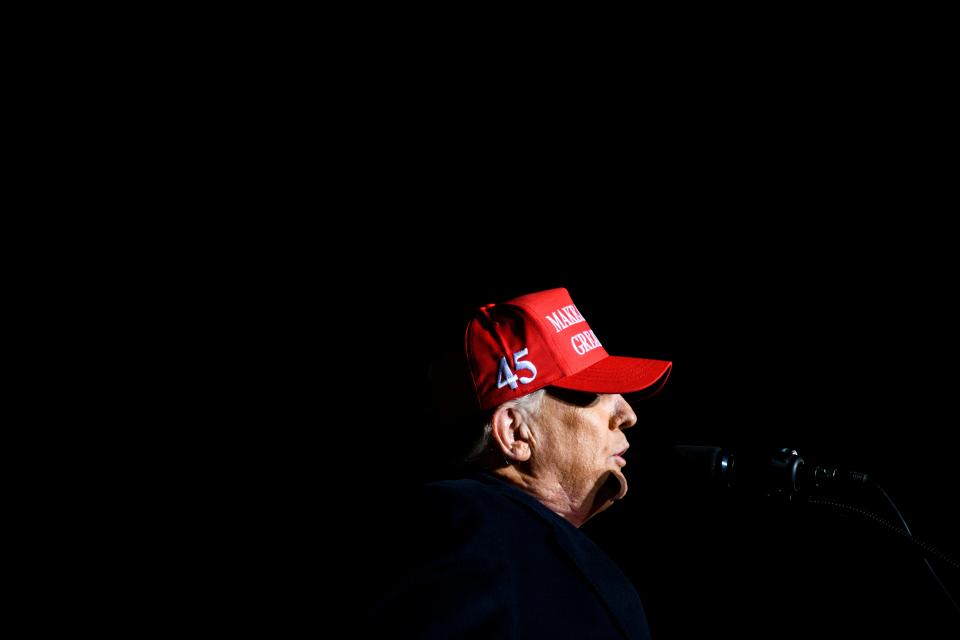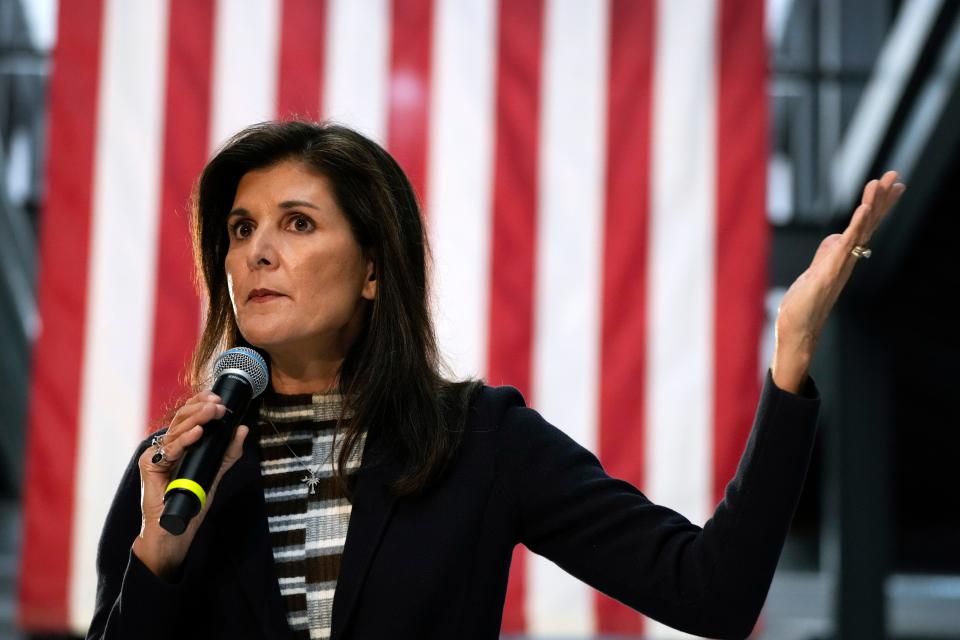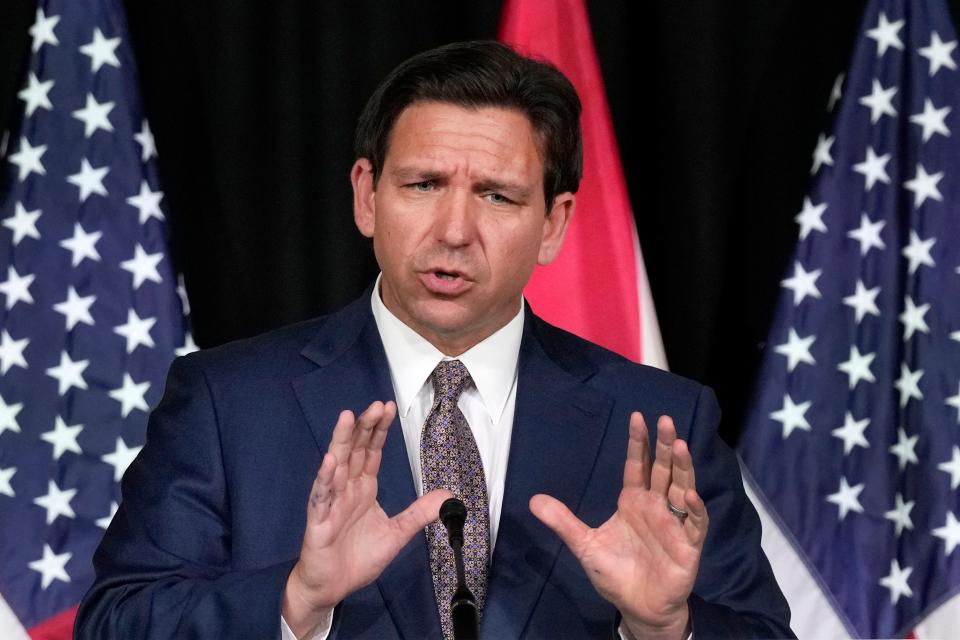Trump. DeSantis. Pence. Haley. Why the Iowa caucuses will be key to deciding GOP nominee
- Oops!Something went wrong.Please try again later.
- Oops!Something went wrong.Please try again later.
- Oops!Something went wrong.Please try again later.
- Oops!Something went wrong.Please try again later.
Republicans hoping to make a splash in the 2024 presidential nomination process may have a shorter runway than usual to launch a campaign that can draw national support — making Iowa's first-in-the-nation caucuses an even more critical early benchmark of success.
For former President Donald Trump, a big win in Iowa could cement his hold on the party and help him build traction with voters in later states — while a loss could indicate debilitating vulnerabilities.
And the growing cadre of Republicans challenging him are expected to face increased pressure from national donors hoping to avoid the kind of fractured field that helped elevate Trump to the nomination in 2016. Those donors are unlikely to tolerate candidates who fail to amass serious support by Caucus Day.
“I think Iowa’s more important than ever this cycle,” said Bob Vander Plaats, president of the influential Christian conservative group The Family Leader. “If Trump were to win and win big in Iowa, I think he runs the table to the nomination. If Trump is halted in Iowa and say a (Ron) DeSantis or a (Mike) Pompeo or a Nikki Haley wins the Iowa caucuses, I think it's now game on to the nomination.”

More:Iowa's 50 Most Wanted: These Republicans will help shape the 2024 presidential caucuses
Iowa’s caucuses have long played the role of winnowing a large field to a group of candidates who have proven they are viable.
“This is a cycle where we certainly will need to winnow out who's a pretender and who's a contender," said Republican political consultant Eric Woolson, a veteran of six presidential campaigns in Iowa.
With outside pressure on candidates to drop out of the race and help the party coalesce behind a Trump alternative, Vander Plaats said, that winnowing process becomes even more critical and may need to happen faster than in other years.
“I think what will happen in Iowa is that quickly the party and America will see who are the two or three or maybe even just one viable candidate going up against the former president,” he said. “That's why I think there's going to then be a call on the other candidates to begin a coalescing and a narrowing of the field.”
Pressure expected to mount for underperforming presidential candidates
Republicans saw a historically large field of candidates in 2016, with 17 Republicans competing in Iowa. A dozen made it to Caucus Day, and three more dropped out shortly after.

Still, five candidates remained in the race on Super Tuesday in March, and Trump did not become the presumptive nominee until May when he trounced U.S. Sen. Ted Cruz in the Indiana primary.
In retrospect, some Republicans fretted that the big field widened Trump’s path to the nomination as candidates such as Cruz, then-Florida Gov. Jeb Bush and former Ohio Gov. John Kasich split the “not Trump” vote. Some major donor groups are already signaling they want to avoid a similar scenario in 2024.
Among them is the Charles Koch-backed Americans For Prosperity, which has a strong presence in Iowa. The group issued a memo in February indicating it plans to get involved in primaries far sooner than in the past, arguing the country needs a president who represents “a new chapter.”
More:Iowa sees a surge of presidential caucus activity after slower start to 2024
An AFP official confirmed to the Des Moines Register the group intends to endorse a candidate other than Donald Trump. The official said in a statement that the group will invest in states with early primaries and key Senate races, using that work to help inform which presidential candidate it will support in Iowa’s caucuses.
Former Maryland Gov. Larry Hogan, who had been weighing a potential run, announced Sunday he would step aside rather than risk "being part of another multicar pileup that could potentially help Mr. Trump recapture the nomination."
More: Former Maryland Gov. Larry Hogan, sharp Trump critic, will not run for president in 2024
In an interview on Face the Nation, he said there are a lot of potential challengers to Trump polling in the single digits, "and the more of them you have, the less chance you have of somebody rising up."
A Real Clear Politics rolling average of presidential primary polls shows Trump leading the prospective field with about 45% of the vote — a strong plurality, though he fails to reach a majority.
Florida Gov. Ron DeSantis, who has emerged in the early stages of the race as Trump’s chief rival, garners about 29%, while every other candidate tested is in single digits.

Matt Dailer, a Republican political consultant who was Iowa U.S. Sen. Chuck Grassley’s 2022 campaign manager, said if candidates running against Trump are serious about taking the country in a new direction, as they’ve already suggested on the stump in Iowa, then they’ll need to heed calls to step aside early if they’re not attracting support.
“Once the writing's on the wall that they aren’t getting the traction they need to pull it off, we need to see these candidates drop out and endorse someone else who is getting traction,” he said.
More: 'I won't even think about leaving': Trump at CPAC says indictment wouldn't push him out of 2024 race
Trump himself has seemed to acknowledge the personal benefit of a crowded primary race.
“The more the merrier,” he told Fox News in a February interview when Haley, his former U.N. ambassador, announced her entry into the race.
Haley announced her presidential campaign last month, has already traveled to Iowa once and plans a second trip in March.
U.S. Sen. Tim Scott, former Vice President Mike Pence, former Arkansas Gov. Asa Hutchinson, entrepreneur Vivek Ramaswamy and Michigan businessman Perry Johnson also made Iowa appearances in February.
A Trump campaign spokesperson said that if more candidates want to enter the race, that’s their prerogative.
Trump recently announced he would make his first Iowa trip of the 2024 cycle March 13 in Davenport. In an interview with WHO radio's Simon Conway on Feb. 28, he said he plans to come back “at least a couple of times before the election.”
In his 2016 caucus campaign, Trump tallied 48 events in Iowa, according to Des Moines Register data.
He ran an unconventional caucus campaign, mostly flying in and out of the state for large rallies that drew hundreds of people, rather than participating in the kinds of retail politics that other candidates embraced. He placed second that year behind Cruz, who participated in 148 Iowa events.
More:Nikki Haley is carving a lane in the Iowa caucuses as Donald Trump looms. Here's how:
Trump continued to travel to the state regularly as president, and he has maintained strong ties to a number of activists and elected officials, whom he endorsed and campaigned for in the 2020 and 2022 elections. Republican political operatives expect him to retain significant support, even as many Iowans consider other contenders.
In Iowa, Trump appears to be on a collision course with DeSantis, the only other potential or declared candidate currently polling in double digits. DeSantis is scheduled to make his Iowa debut with events in Davenport and Des Moines March 10.
Still, Woolson said, it’s healthy to see additional candidates competing in Iowa even if the party works to winnow the field more aggressively than it has in past cycles. Caucusgoers have seen highly touted contenders flop once their campaigns are put to the test, he said, while unknowns have risen to victory.
“If the Republican Party has put all its eggs in the basket of Ron DeSantis going head-to-head with Donald Trump and then DeSantis decides for whatever reason not to run or if he drops out, where are we then?” Woolson said. “So I welcome seeing Gov. Haley. I'd like to see Vice President Pence and other folks come to Iowa to have us test them out and see what happens.”
More:Mike Pence rails in Iowa against 'radical gender ideology' as caucuses start to simmer
In Iowa, key activists could help caucusgoers coalesce
Candidates need money to run robust national campaigns, so the whims of national donors are important. But Iowa’s caucuses are driven more by grassroots organizing, and candidates like former U.S. Sen. Rick Santorum and former Arkansas Gov. Mike Huckabee both earned caucus night victories on shoestring operations.
So in Iowa, key endorsers can play a bigger role in helping to coalesce support around candidates ahead of Caucus Day.
Vander Plaats, who is a key envoy to Iowa’s evangelical voters and has typically endorsed candidates ahead of Caucus Day, said he may do so again in an effort to unite that base of caucusgoers.
“My role is to have an open and fair playing field for all the candidates who want to be introduced to our base,” said. “And then as the process goes on, you know, to have the pulse of our base, but also to really see you know, who's got the traction? Who has our shared beliefs and values? And maybe to help give direction at some point if I believe that's needed.”
More:Iowa's 50 Most Wanted: These Republicans will help shape the 2024 presidential caucuses
Some of Iowa’s top Republican elected officials, such as Gov. Kim Reynolds and U.S. Sens. Joni Ernst and Chuck Grassley, have said they don’t plan to endorse this cycle. But others may choose to wade in.
U.S. Rep. Randy Feenstra, who represents the critically important 4th Congressional District, said he hasn’t ruled it out.
“It's always on the table,” Feenstra told the Register. “I'll have to see through the process and how it goes, but if there's a right candidate, absolutely.”
Republicans who want to win Iowa will need to make inroads in the 4th District, which covers 36 counties in the northwest corner of the state and includes some of the most conservative pockets of Iowa, where support for Trump soared in 2020. In Sioux and Lyon counties, Trump defeated Democrat Joe Biden with about 82% of the vote.
Still, Feenstra said he thinks there’s space for other Republicans to compete.
“I just think there's room,” he said. “And being an ambassador to the state, that's what I'm excited about is to just bring everybody here.”
He said he thinks the right candidate is someone who can help the party “look forward.”
“I ran a campaign about delivering results,” he said. “And I think that's got to be the bottom line for presidential candidates coming in here is how can we deliver results for rural Iowa?”
Brianne Pfannenstiel is the chief politics reporter for the Register. Reach her at bpfann@dmreg.com or 515-284-8244. Follow her on Twitter at @brianneDMR.
This article originally appeared on USA TODAY: Why the Iowa Republican caucuses in 2024 are more important than ever

